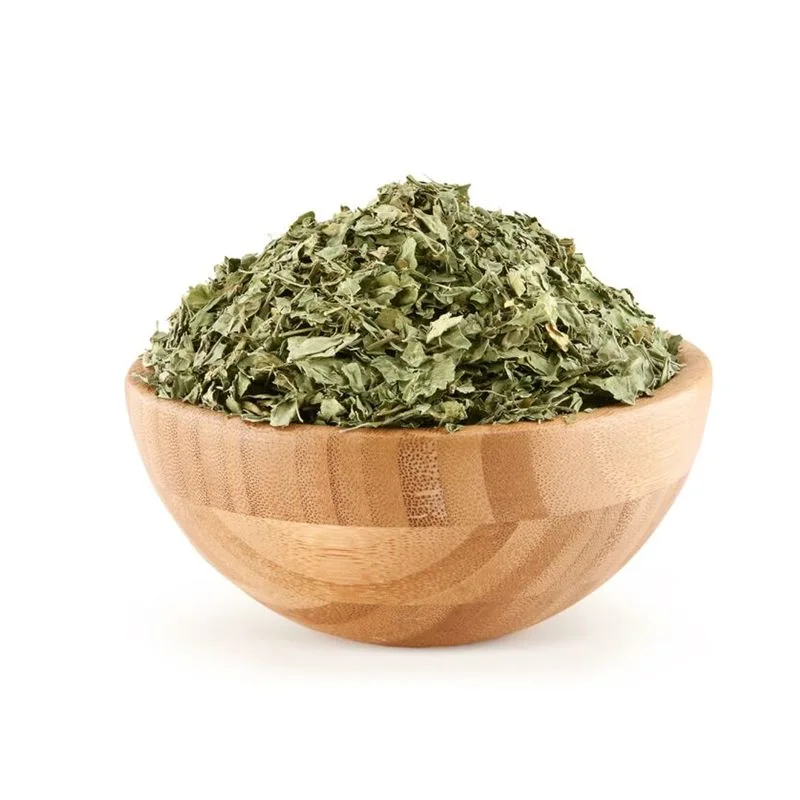Export Information on Moringa (Egyptian Origin)
1. Product Name
Moringa Leaves
Scientific Name: Moringa oleifera
Common Names: Drumstick Tree, Miracle Tree
2. Description
Moringa is a highly nutritious plant native to tropical and subtropical regions, widely cultivated in Egypt for its leaves, seeds, and pods. The leaves are the most commonly exported product due to their exceptional nutritional profile, which includes vitamins, minerals, and antioxidants. Moringa is often referred to as the “Miracle Tree” because of its numerous health benefits and versatility in culinary, medicinal, and industrial applications.
3. Physical Characteristics
Appearance : Small, oval-shaped leaves that are dark green when fresh and olive-green when dried.
Texture : Dried leaves are brittle and lightweight, often ground into powder for convenience.
Odor : Mild, earthy, and herbal aroma.
Taste : Slightly nutty with a mild bitterness.
Moisture Content : Typically ≤ 8% to ensure preservation.
4. Chemical Properties
Phytochemicals : Rich in flavonoids, glucosinolates, and phenolic compounds.
Protein Content : Contains all essential amino acids, making it a complete protein source.
pH Level : Approximately 6.0–7.0 (neutral).
Ash Content : ~7–10%.
Soluble Compounds : High in water-soluble vitamins, antioxidants, and bioactive compounds.
5. Nutritional Information (Per 100 g)
Calories : ~92 kcal
Protein : 27.1 g
Fat : 2.3 g
Carbohydrates : 38.2 g
Dietary Fiber : 19.2 g
Vitamins :
Vitamin A: ~18,900 IU
Vitamin C: ~500 mg
Vitamin E: ~113 mg
Folate: ~44 µg
Minerals :
Calcium: ~2,000 mg
Iron: ~28.2 mg
Magnesium: ~368 mg
Potassium: ~1,324 mg
6. Quality Standards
Color : Uniform dark green to olive-green, free from discoloration.
Foreign Matter : ≤ 0.5% (no visible stems, seeds, or contaminants).
Particle Size : Powdered form typically passes through a 200-mesh sieve; whole leaves or crushed pieces available upon request.
Purity : Free from adulterants, artificial additives, or chemical residues.
Organoleptic Properties : Fresh, herbal aroma; no off-flavors or odors
Compliance with Local and European Specifications According to Food Safety.
7. Microbiological Standards
Total Plate Count (TPC) : ≤ 10,000 CFU/g
Yeast and Mold : ≤ 100 CFU/g
Coliforms : Absent in 1 g
E. coli : Absent in 1 g
Salmonella : Absent in 25 g
Aflatoxins : ≤ 4 ppb (as per EU standards).
8. Storage
Temperature : Store in a cool, dry place (≤ 25°C).
Humidity : Relative humidity should be ≤ 60% to prevent moisture absorption.
The packaging is in polypropylene bags, cardboard boxes, or as per customer request.
9. Shelf Life
Unopened Packaging : Up to 24 months under recommended storage conditions.
Opened Packaging : Consume within 6 months for optimal quality.
10. Applications
Culinary Uses :
Added to smoothies, soups, and sauces for enhanced nutrition.
Used as a seasoning or garnish in traditional dishes.
Health Benefits :
Boosts immune function due to high vitamin C content.
Supports bone health with its rich calcium and magnesium content.
Improves energy levels and reduces fatigue due to iron and B vitamins.
Antioxidant-rich, helping combat oxidative stress and inflammation.
Cosmetic Uses :
Extracts incorporated into skincare products for their anti-inflammatory and moisturizing properties.
Industrial Uses :
Used in the production of dietary supplements, teas, and powdered superfoods.
11. Origin
Country of Origin : Egypt
Egypt’s warm climate and fertile soil provide ideal growing conditions for moringa, ensuring high-quality leaves with excellent nutritional profiles.
Egyptian moringa is renowned for its vibrant color, potent nutrients, and consistent quality.
Contact information:



